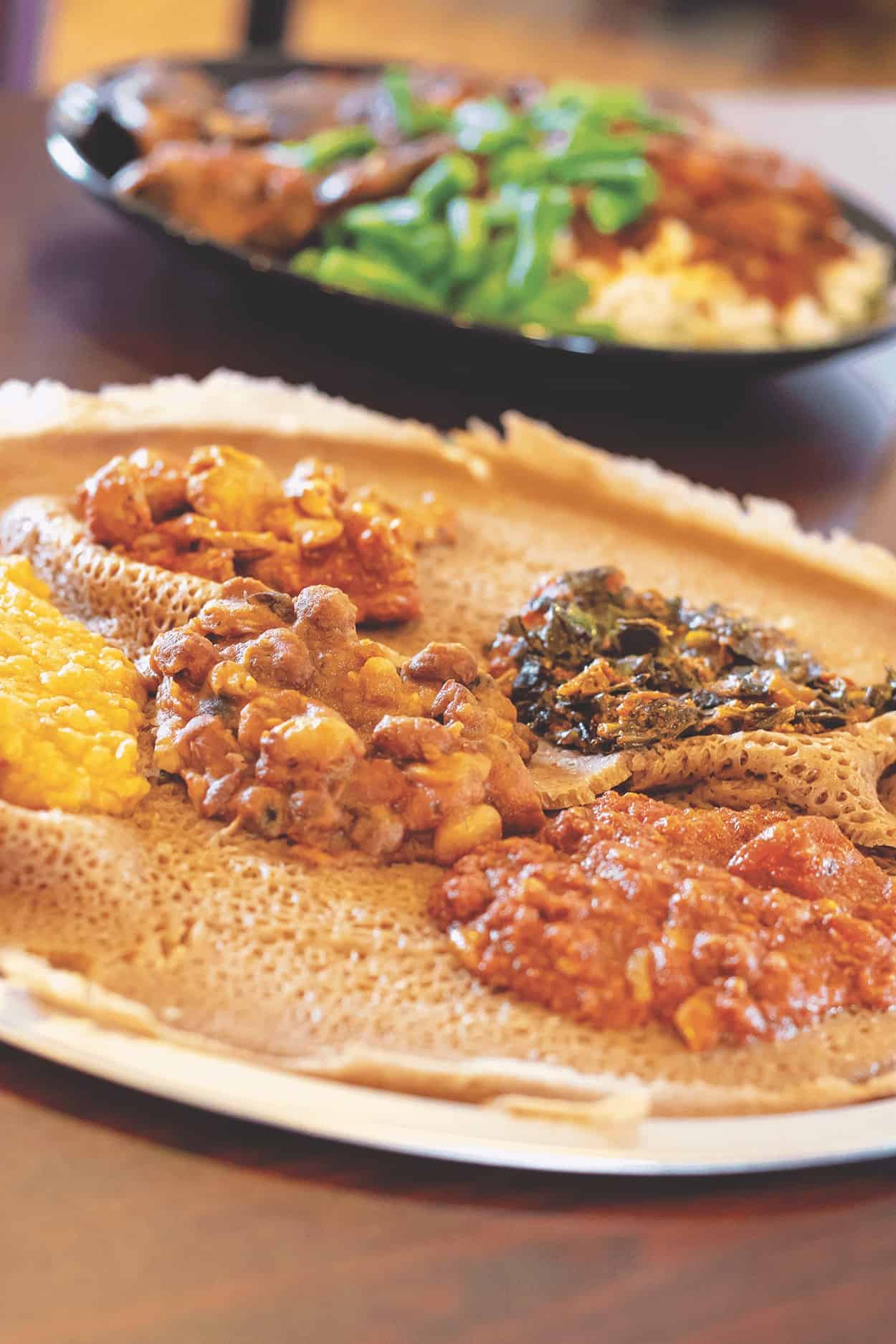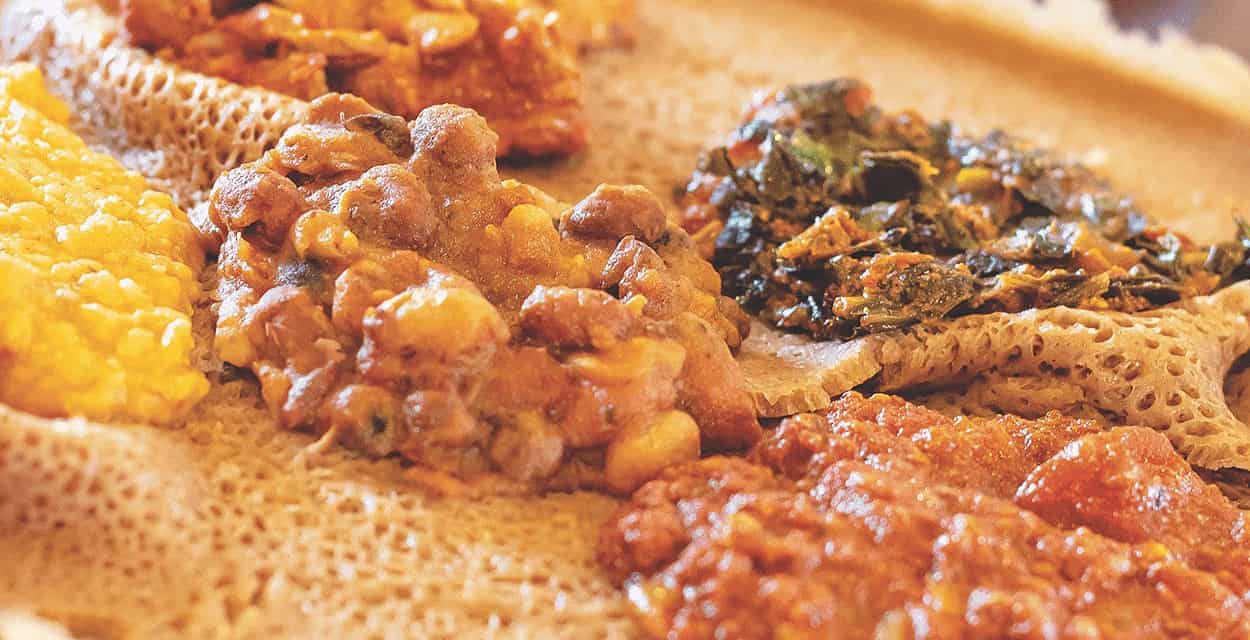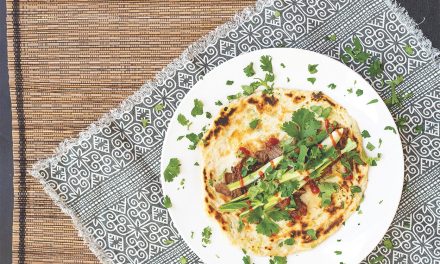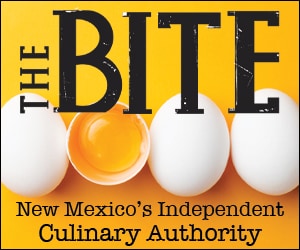Talking Drums Gives Albuquerque a Taste of Africa
By Candolin Cook · Photos by Stephanie Cameron

“I’m boring!” insists Toyin Oladeji, chef/owner of Talking Drums, as I pepper her with questions about her life and business. She is too modest. Although the soft-spoken, Nigerian-born grandmother of three lacks the braggadocio of many American-born chefs, the bold flavors she creates in her spice-forward African and Caribbean dishes suggest she is anything but insipid.
Oladeji grew up in a family of eight children—“one boy and seven brides.” She says, “There was a lot of cooking in my house. Because there were so many girls, we had to take turns—that is very traditional in Nigeria—but the boy was not spared in my family. My father believed you have to know how to take care of yourself.” In 1986, Oladeji and her then-partner left West Africa for Canada where she lived for a decade. “Back home I was a midwife, but when I moved to Canada, midwifery was illegal back then, so I stayed home. I [eventually decided] to move to the United States to find work. Albuquerque was the first place where I found a job,” she explains. “I loved it here.”
In 2000, Oladeji opened Zenith African Caribbean Market, the only African store in New Mexico at the time, offering clothing, jewelry, beauty products, and art. By popular demand, they also began stocking African groceries like palm oil and yams. Oladeji says, “I used to go to El Paso to find African food and items. Someone suggested ‘Why not add food to your store?’ Then they started asking what if they wanted to taste the food?” So, in 2012, Oladeji and her business partner Alex Ogunsanya created Talking Drums, which is now situated next to Zenith Market on Central Avenue, near University Boulevard.
Oladeji’s transition into restaurateur came as a surprise to her. “I’m not a food person, I’m not picky, I’ll eat anything. I enjoy the art of cooking now, but for the longest time food was the last thing on my mind.” She says she simply started making the food she’d grown up eating: pepper soup with goat, yam and corned beef stew, moin moin (Nigerian steamed bean pudding), and oxtail. Pressed to pick a favorite, Oladeji selects fufu, a West African staple.
Fufu is a starchy dough ball made from boiled and pounded grains or starchy vegetables like cassava, yams, or plantains, which is dipped into a soup. At Talking Drums, diners have the option of picking their fufu flour and soup—including peanut, bitterleaf, palmnut, spinach, ewedu (jute leaves), and, Oladeji’s favorite, okra. As for the flour selection, Oladeji explains that pounded yam has the tendency to “weigh you down, which goes along with how we eat back home. We don’t snack throughout the day. We eat a bigger meal because there is a lot of walking around and manual work, so it gets burned up. So here, people might like the amala [toasted yam], which is earthier and lighter.” As with many of the dishes at Talking Drums, Oladeji encourages diners to use their hands to eat fufu. “That is the authentic way,” she says. Adds Ogunsanya, “God made hands long before cutlery.” Along with their fufu, diners receive a bowl of water to moisten their fingers, making it easier to pull off pieces of the sticky dough. Pressing your thumb into the dough creates a spoon of sorts to then dip into the soup. You place the morsel on your tongue and let it slide down your throat. “Don’t chew your fufu!” Oladeji instructs.

While the menu is full of authentic and flavorful West African fare, the most popular items at Talking Drums come from Ethiopia—the injera—and the Caribbean—jerk chicken. While these dishes may be more familiar to Americans, Oladeji has put her own twist on them, incorporating Nigerian spices and techniques. “I believe in whatever you’re doing to make it your own. I don’t believe in messing up East African food or Caribbean food, but if I can make it better I think that’s great. I’ve had Caribbeans tell me they prefer my jerk chicken.”
Talking Drums is a family-friendly restaurant and a family affair for Oladeji. As she speaks with me one of her grandsons is swaddled to her back by vibrant turquoise fabric. “This one is here most of the time,” she says. “I’d rather have him with me than at a daycare. And he likes to eat, so he loves it.” Her daughter Loretta is a nurse, but will also help cook, especially when they have events. Though not related, she calls Ogunsanya (also originally from Nigeria) her brother—“Back home we only have sisters and brothers, doesn’t matter if you’re really my cousin [or friend]”—and credits him with keeping Talking Drums going. “If Alex [Ogunsanya] is not here, we can’t open. I think he is the reason people come here. He is too friendly. I think he could run for mayor of Albuquerque and win. I’m not as much of a talker, but I like coming here every day to be among people. Otherwise, I’d just be at home—[being here] is my day off,” she chuckles.
When asked the meaning behind the name Talking Drums, Oladeji says, “They use drums to communicate back home. The drummers will interact through playing the drums: ‘Good morning, how are you today,’ and the other will respond. Probably, historically, they used it in times of war. Alex picked the name. I didn’t really like it at first because I don’t think talking drums has anything to do with food.” Looking at the plate of smokey, West African-Caribbean jerk chicken before me, I say, “Well, maybe, the way they speak through their drums, you similarly communicate through your food.” “That’s what Alex said!” Oladeji says with a surprised laugh. Based on all the food I tasted at Talking Drums, this is a conversation you’ll want to join.
1606 Central SE, Albuquerque, 505-792-3221,
www.talkingdrumsabq.com
Candolin Cook is a historian, writer, editor, and former co-editor of edible New Mexico. She recently received her doctorate in history from the University of New Mexico and is working on her first book.













